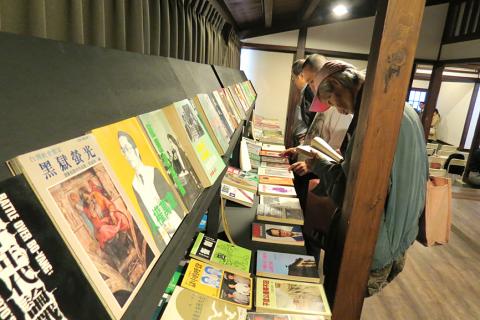The Taichung Civil Affairs Bureau on Monday opened a special exhibition of 300 best-sellers that were banned by the former Chinese Nationalist Party (KMT) government.
The exhibition at the Taichung Literature Museum is as part of the city’s human rights and culture festival, and features books from author Liao Wei-min’s (廖為民) private collection.
Visitors can see well-known works, such as Jin Yong’s (金庸) The Legend of Condor Heroes (射雕英雄傳), which is widely considered a classic of the martial arts genre and one of the greatest commercial successes in modern Chinese-language fiction. The book is displayed in “the ridiculously banned books” section.

Photo: Su Meng-chuan, Taipei Times
Exhibition organizer Chen Yan-pin (陳彥斌) said there is no agreed upon explanation for why Jin’s historical fantasy was banned.
One hypothesis is that the title contains the word diao (鵰), a bird that also appeared in a line of late Chinese leader Mao Tze-tung’s (毛澤東) poem about Genghis Khan; another is that because Jin’s Hong Kong-based newspaper Ming Pao expressed views that offended KMT leaders at the time, Chen said.
Many books that touched on the political climate of the time were banned by censors, such as Long Live the Election (選舉萬歲), a story about civil unrest in Taoyuan in 1977 that was sparked by allegations of ballot-fixing, Chen said.
However, books were also banned because of the author’s political engagements in person or by association, such as The History of Taiwanese Animals (台灣動物史話), which was banned because its author, Liu Feng-sung (劉峰松), was the husband of dissident-turned-politician Wong Chin-chu (翁金珠), Chen said.
“From a modern perspective, it might seem incredible that books like The Legend of Condor Heroes were banned, but the banning of Jin’s book shows the absurdity of the authoritarian period’s preoccupation with imprisoning the minds of Taiwanese,” he said.
Liao, who worked for the Taichung Books and Journals Publishing Co and Humanity Magazine (人間雜誌), said censorship of literature started in 1978, when censors seized copies of Long Live the Election before they could be bound.
About a dozen titles were banned from circulation annually until 1987, when censorship was eased with the lifting of martial law, but it did not end until August 1992, when the Taiwan Garrison Command was disbanded, he said.
Liao said he voraciously bought banned books during the Martial Law era because he felt obliged to “keep the fire of Taiwanese thought” alive, and he often received “invitations to chat over tea or coffee” by the Taiwan Garrison Command as a result.
“We should treasure the rights and freedoms that we now enjoy,” Liao said.
The exhibition is organized by subject, such as proscribed books or rare books, with a section dedicated to works edited or authored by democracy movement pioneer Deng Nan-jung (鄭南榕), who died after setting himself on fire on April 7, 1989.
The exhibition runs until April 16, organizers said.

Taiwanese can file complaints with the Tourism Administration to report travel agencies if their activities caused termination of a person’s citizenship, Mainland Affairs Council Minister Chiu Chui-cheng (邱垂正) said yesterday, after a podcaster highlighted a case in which a person’s citizenship was canceled for receiving a single-use Chinese passport to enter Russia. The council is aware of incidents in which people who signed up through Chinese travel agencies for tours of Russia were told they could obtain Russian visas and fast-track border clearance, Chiu told reporters on the sidelines of an event in Taipei. However, the travel agencies actually applied

Japanese footwear brand Onitsuka Tiger today issued a public apology and said it has suspended an employee amid allegations that the staff member discriminated against a Vietnamese customer at its Taipei 101 store. Posting on the social media platform Threads yesterday, a user said that an employee at the store said that “those shoes are very expensive” when her friend, who is a migrant worker from Vietnam, asked for assistance. The employee then ignored her until she asked again, to which she replied: "We don't have a size 37." The post had amassed nearly 26,000 likes and 916 comments as of this

New measures aimed at making Taiwan more attractive to foreign professionals came into effect this month, the National Development Council said yesterday. Among the changes, international students at Taiwanese universities would be able to work in Taiwan without a work permit in the two years after they graduate, explainer materials provided by the council said. In addition, foreign nationals who graduated from one of the world’s top 200 universities within the past five years can also apply for a two-year open work permit. Previously, those graduates would have needed to apply for a work permit using point-based criteria or have a Taiwanese company

The Shilin District Prosecutors’ Office yesterday indicted two Taiwanese and issued a wanted notice for Pete Liu (劉作虎), founder of Shenzhen-based smartphone manufacturer OnePlus Technology Co (萬普拉斯科技), for allegedly contravening the Act Governing Relations Between the People of the Taiwan Area and the Mainland Area (臺灣地區與大陸地區人民關係條例) by poaching 70 engineers in Taiwan. Liu allegedly traveled to Taiwan at the end of 2014 and met with a Taiwanese man surnamed Lin (林) to discuss establishing a mobile software research and development (R&D) team in Taiwan, prosecutors said. Without approval from the government, Lin, following Liu’s instructions, recruited more than 70 software